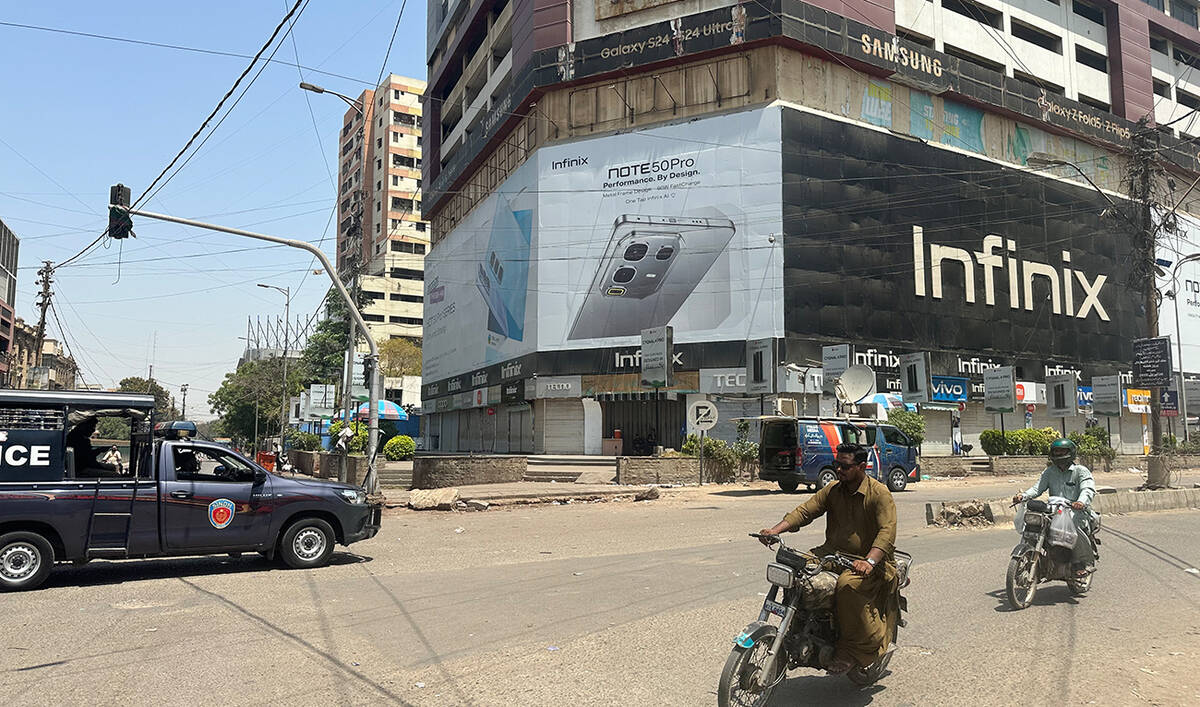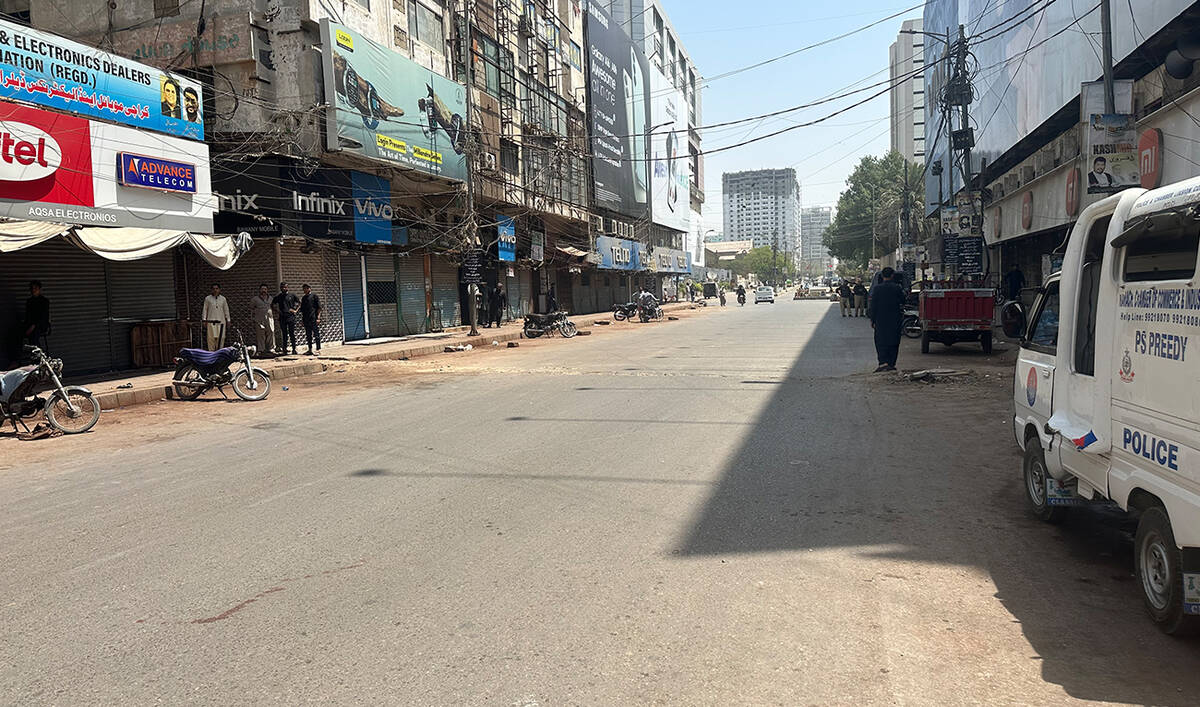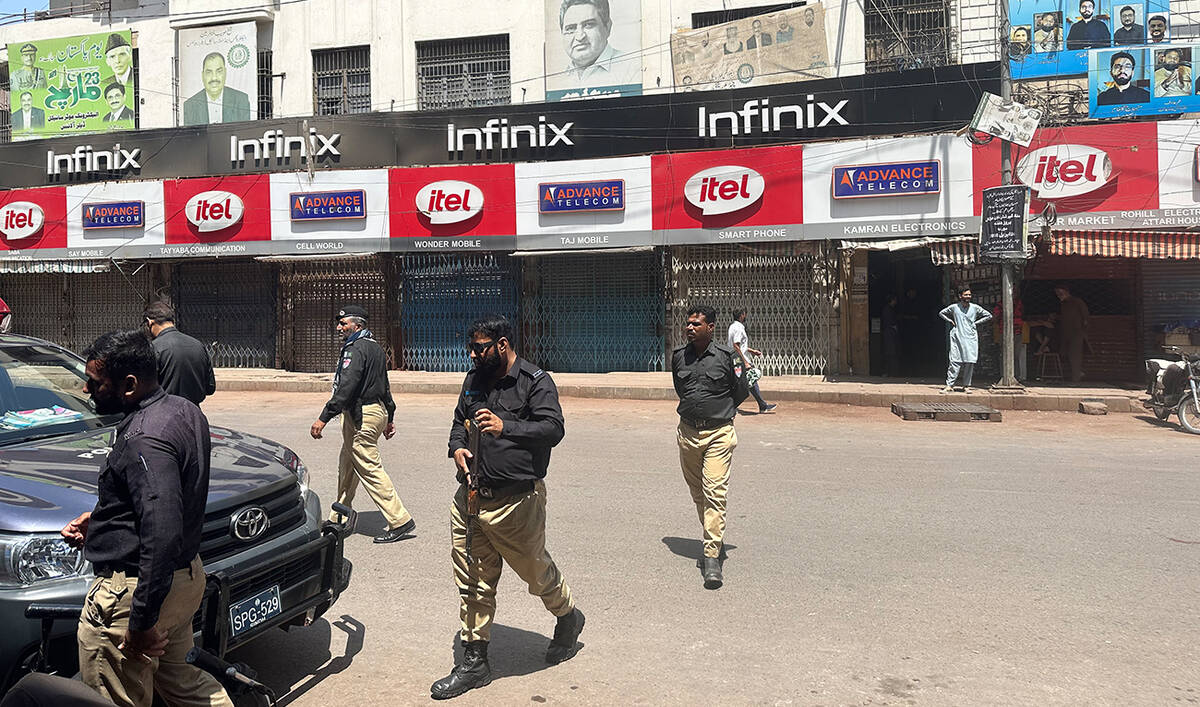ISLAMABAD: Pakistan’s religious affairs ministry on Friday announced the successful completion of a survey carried out by a Saudi delegation at the Jinnah International Airport in Karachi to fast track the implementation of Makkah Route Initiative to facilitate local pilgrims ahead of the Hajj season this year.
Launched as part of the kingdom’s Vision 2030 plan, the initiative allows for the completion of immigration procedures at the pilgrim’s country of departure, making it possible to bypass long immigration and customs checks upon reaching Saudi Arabia, which significantly reduces the waiting time and makes the entry process smoother and faster.
Pakistani pilgrims performing Hajj under the government scheme have been availing this facility at the airport in Islamabad for the last couple of years. But the government wants the initiative to be extended to other cities as well.
“Saudi immigration and customs clearance of pilgrims traveling from Karachi will be completed at the airport in the Pakistani city,” announced the office of Dr. Syed Atta-ur-Rahman, federal secretary at the ministry, on Friday. “There is a strong likelihood that Saudi officials will introduce the latest immigration technology at the Karachi airport, enabling the immigration processes to be completed in less than a minute.”
Pilgrims availing the Makkah Route Initiative will get their luggage right at their doorstep. Dr. Atta-ur-Rahman said the modern system would significantly reduce complaints of lost luggage.
Pakistan expects more than 60 percent of pilgrims performing Hajj this year to benefit from the initiative. People opting for the private Hajj scheme can also avail the facility, provided that the company providing them services have contacted the ministry for the purpose.
Saudi Arabia last year restored Pakistan’s pre-pandemic Hajj quota of 179,210 pilgrims and abolished the upper age limit of 65 years. More than 81,000 Pakistani pilgrims performed Hajj under the government scheme in 2023, while the rest used private tour operators.
This year’s pilgrimage is expected to run from June 14 till June 19.
Pakistan announces completion of survey for Makkah Route Initiative at Karachi airport ahead of Hajj season
https://arab.news/jwh4q
Pakistan announces completion of survey for Makkah Route Initiative at Karachi airport ahead of Hajj season

- More than 60 percent of Pakistani pilgrims on government program are likely to benefit from the initiative this year
- Private Hajj operators can also avail the facility for pilgrims by contacting ministry officials for the purpose on time
Pakistan’s commercial capital shuts down on religious party’s call for strike over Gaza

- The strike was widely supported by organizations representing traders, lawyers and people from different walks of life
- Pakistan has consistently demanded Israel’s accountability and called for uninterrupted flow of humanitarian aid into Gaza
KARACHI: Markets and businesses remained shut in Pakistan’s commercial capital of Karachi on Saturday in response to a nationwide strike called by Jamaat-e-Islami (JI) religious party to express solidarity with the people of Gaza, amid renewed Israeli military strikes in the Palestinian enclave.
The strike was widely supported by various organizations representing traders, lawyers and people from different walks of life, and there was no major commercial activity in the southern Pakistani port city.
It followed massive Gaza solidarity marches in Lahore, Karachi and Islamabad this month, which were attended by tens of thousands of Pakistanis who demanded the world stop Israeli military actions.
“Today, there is a strike throughout Karachi,” JI Karachi chief Monem Zafar Khan said, noting the strike was not only supported by Karachi’s business community but also by professionals and civil society groups.
“It is a shutter-down strike, and the entire business community of Karachi, the lawyers of Karachi, the students of Karachi, the scholars of Karachi, the civil society of Karachi — all of them are supporting this.”

The strike was largely observed in Karachi and it could only partially take hold elsewhere in Pakistan.
Pakistan, which does not have diplomatic ties with Israel, has consistently condemned Israeli military actions and called for the uninterrupted flow of humanitarian aid into the Palestinian territory.
The South Asian country has stressed the urgent need to revive negotiations aimed at a two-state solution to the Palestine Issue, with East Jerusalem as the capital of a future Palestinian state.

Muhammad Aslam Khan, general-secretary of the Cooperative Market Association, condemned Israel’s war on Gaza, which has killed over 50,000 Palestinians since Oct. 2023, and demanded stronger international action over it.
“It is now 12 o’clock and the city is completely silent and shut down,” Aslam told Arab News, surrounded by closed shops in the Saddar business district.
“We are sending them [Palestinians] a clear message that the hearts of the people are beating for the Palestinian Muslims, and we are deeply pained by the genocide happening to them, the oppression they are facing, and the fact that their basic needs like food and water have been completely cut off.”

Usman Sharif, a representative of the All-Pakistan Cottage Industry Association in Karachi, said the Pakistani trader fraternity wanted to contribute to the Palestinian cause.
“Every trader says that they want to contribute in some way, whether it be through prayers, funds, participating in the strike, joining a rally, or through a boycott,” he said.
“The strike is happening across Pakistan, and here in Karachi as well, people have participated in the strike.”
Pakistan asks intending pilgrims to get vaccinated against meningitis, flu before leaving for Hajj

- Pakistan will launch its Hajj flight operations from April 29
- Over 113,000 Pakistanis are expected to perform Hajj this year
ISLAMABAD: Pakistan’s religious affairs ministry on Saturday asked intending pilgrims to get vaccinated against meningitis, flu and polio before leaving for Saudi Arabia to perform the annual Hajj pilgrimage.
The annual pilgrimage is expected to take place in June. Nearly 90,000 Pakistanis are expected to travel to Saudi Arabia under the government scheme, while 23,620 Pakistanis will perform Hajj through private tour operators this year.
The South Asian country started vaccinating intending Hajj pilgrims against meningitis, flu and polio this week, with arrangement for the vaccination of pilgrims at 11 Hajj camps across the country.
The religious affairs ministry said it was mandatory to get the vaccinations, which are free of charge, warning that all pilgrims have to get jabbed and receive a proof of vaccination before leaving for the Kingdom.
“Without this, entry into Saudi Arabia will not be possible,” it said in a statement.
“Pilgrims over 65 years of age must carry their old coronavirus vaccine card. In case of absence of the card, only pilgrims over 65 years of age should get the coronavirus vaccine from the nearest Hajj camp.”
Pakistan will launch Hajj flight operations from Apr. 29, with the first flight departing from the eastern city of Lahore.
While a precise number of pilgrims for Hajj 2025 is difficult to be determined in advance, projections suggest it will be a record-breaking year, with over 2.5 million pilgrims expected.
Pakistan PM says prepared to defend sovereignty, calls for ‘neutral’ probe into Kashmir attack

- Shehbaz Sharif’s remarks came as Indian, Pakistani troops exchanged gunfire for a second straight day on Saturday
- Ties have plummeted between the nuclear-armed neighbors over this week’s attack in Pahalgam that killed 26 tourists
ISLAMABAD: Prime Minister Shehbaz Sharif on Saturday said Pakistan’s armed forces were fully prepared to defend the country’s sovereignty and called for a “neutral” investigation into a militant attack in Indian-administered Kashmir that has brought Pakistan and India close to the brink of another conflict.
Sharif’s remarks came as Indian and Pakistani troops exchanged gunfire for a second straight day on Saturday as ties plummeted between the two nuclear-armed neighbors over the attack in Pahalgam that killed 26 tourists on Tuesday.
Indian police have identified three suspects, including two Pakistani nationals, who carried out the April 22 attack. Pakistan has denied any involvement. Since the attack, both nations have unleashed a raft of measures against each other, with Pakistan closing its airspace to Indian airlines and India suspending the 1960 Indus Waters Treaty that regulates water-sharing from the Indus River and its tributaries.
Sharif said the tragic incident in Pahalgam was yet another example of New Delhi’s “perpetual blame game” that must come to a halt, adding that Islamabad was “open to participate in any neutral, transparent and credible investigation.”
“Water is a vital national interest of Pakistan... any attempt to stop, reduce or divert the flow of water belonging to Pakistan under the Indus Water Treaty would be responded to with full force and might and nobody should remain under any kind of false impression and confusion,” Sharif said during a passing-out parade at the Pakistan Military Academy in Abbottabad.
“Our valiant armed forces remain fully capable and prepared to defend the country’s sovereignty and its territorial integrity against any misadventure as clearly demonstrated by its measured yet resolute response to India’s reckless incursion in February 2019.”
Sharif’s comment was a reference to the downing of an Indian fighter jet in 2019 in response to Indian airstrikes in Pakistan, following a militant attack in Pulwama in Indian-administered Kashmir in which at least 40 Indian paramilitary police were killed. India had also blamed the Pulwama attack on Pakistan, Islamabad had denied any complicity.
Kashmir has been divided between India and Pakistan since their independence in 1947, with both claiming the territory in full but governing separate portions of it.
Rebel groups have waged an insurgency in Indian-controlled Kashmir since 1989, demanding independence or a merger with Pakistan.
Tuesday’s assault happened as tourists enjoyed tranquil mountain views at the popular site at Pahalgam, when gunmen burst out of forests and raked crowds with automatic weapons. Survivors told Indian media the gunmen targeted men and spared those who could give the Islamic declaration of faith.
Modi on Thursday said his country would “track and punish every terrorist and their backer,” vowing to “pursue them to the ends of the Earth.” There has been growing concern since Tuesday’s attack that India could conduct a military strike in Pakistani territory as it did in 2019.
The United Nations has urged the nuclear-armed neighbors to show “maximum restraint,” while US President Donald Trump has downplayed the tensions, saying that the dispute will get “figured out, one way or another.”
Rapidly deteriorating relations between India and Pakistan over the deadly shooting in Indian-administered Kashmir are starting to have small but prickly economic consequences for both nations.
While India unveiled a series of mostly symbolic diplomatic measures against Pakistan, Islamabad responded on Thursday with similar tit-for-tat measures but upped the ante by halting trade with New Delhi and closing its airspace to Indian airlines.
Experts say that while the retaliatory moves will not have an immediate or far-reaching impact, it will likely result in longer and more expensive flights for Indians, while forcing Pakistan to increase pharmaceutical imports from other countries.
High-level Pakistan delegation to visit US ‘shortly’ to address trade imbalance, finmin says

- The development comes as the South Asian country mulls options to offset a trade imbalance that has triggered higher tariffs from Washington
- The US is Pakistan’s largest export market with over $5 bln annual exports as of 2024, while Pakistan’s imports from the US are about $2.1 bln
KARACHI: A high-level Pakistani delegation will “shortly” visit the United States to address trade imbalance between the two countries, Pakistani Finance Minister Muhammad Aurangzeb said on Friday.
The statement came after Aurangzeb’s meeting with Thomas Lersten, a senior State Department Official for economic growth, energy and environment, in Washington, on the sidelines of the International Monetary Fund-World Bank spring meetings.
The development comes as Islamabad mulls options, which range from importing crude oil from the US to abolishing tariffs on American imports, to offset a trade imbalance that has triggered higher tariffs from Washington.
In his meeting with Lersten, Aurangzeb thanked the United States for the participation of a well-represented US delegation in a minerals summit held in Pakistan this month, according to the Pakistani finance ministry.
“He expressed Pakistan’s desire to engage constructively to address the trade imbalance between the two countries and informed that a high-level trade and investment delegation was expected to visit the United States shortly to explore avenues of mutually rewarding economic engagement,” the ministry said.

Pakistan is looking to buy more cotton and soybean from the US, while it is also in talks to tear down non-trade barriers to open its markets to more US products.
“We can also look at if there are any issues with respect to non-tariff discussion, whether there are any onerous inspections at our end for US products, we can obviously view that,” Aurangzeb told Bloomberg this week.
Islamabad is trying to appease the US to seek reprieve from the 29 percent reciprocal tariffs imposed by Trump. Those levies are on hold until July.
The US is Pakistan’s largest export market with over $5 billion in annual exports as of 2024, while Pakistan’s imports from the US are about $2.1 billion.
Aurangzeb also held a meeting with senior representatives of the US Export-Import Bank (EXIM), led by its Vice Chairman Jim Barrows, according to his ministry. The finance minister briefed the EXIM delegation on Pakistan’s improving macroeconomic fundamentals and the fiscal consolidation measures undertaken by the government.
“He called for the EXIM Bank’s enhanced support to facilitate greater US investment in Pakistan,” the finance minister said.
“Senator Aurangzeb further expressed Pakistan’s desire to engage constructively with the United States to address tariff-related issues and strengthen bilateral trade relations.”
Authorities are trying to rebuild Pakistan’s tattered economy after it came close to a default in 2023. The South Asian nation last year secured a 37-month, $7 billion IMF program to help stabilize the $350 billion South Asian economy.
This month, Fitch upgraded Pakistan’s credit rating, citing confidence that the South Asian country will be able to sustain reforms under the IMF loan program.
SCO security chief in Pakistan as Indian, Pakistani forces continue to exchange fire in Kashmir

- Tensions between Pakistan, India have soared over an attack in Indian-administered Kashmir’s Pahalgam that killed 26 tourists in one of the deadliest assaults in decades
- Both nations have unleashed a raft of measures against each other, with Pakistan closing its airspace to Indian airlines, and India suspending the 1960 Indus Waters Treaty
ISLAMABAD: Maj. Gen. Ularbek Sharsheyev, executive director of the Shanghai Cooperation Organization’s (SCO) Regional Anti-Terrorist Structure (RATS), has met a top Pakistani military commander, the Pakistani military said on Saturday, Indian and Pakistani troops exchanged gunfire for a second straight day in Kashmir.
The visit comes at a time of heightened tensions between nuclear-armed Pakistan and India over an attack in Indian-administered Kashmir’s Pahalgam area that killed 26 tourists on Tuesday. Kashmir’s police have identified three suspects, including two Pakistani nationals, who carried out the attack. Pakistan has denied any involvement and its defense minister has called for an international probe into the attack.
The Indian Army said its troops responded to “unprovoked” small arms fire from multiple Pakistan Army posts that started around midnight on Friday along the 740-km de facto border separating the disputed Kashmir region, Reuters reported. There was no immediate comment from the Pakistani military.
The Inter-Services Public Relations (ISPR), the Pakistani military’s media wing, said Maj. Gen. Sharsheyev met with General Sahir Shamshad Mirza, chairman of the Joint Chiefs of Staff Committee, at the Joint Staff Headquarters in Rawalpindi, where they discussed “evolving security dynamics in the region.”
“During meeting, both sides discussed evolving security dynamics in the region and collaborative measures to enhance counter terrorism cooperation,” the ISPR said in a statement.
“CJCSC [Gen. Mirza] acknowledged the efforts of SCO (RATS) for promoting regional cooperation to fight the menace of terrorism and reaffirmed Pakistan’s strong commitment in ensuring sustainable peace at reginal and global level.”
India and Pakistan have a decades-old ceasefire agreement over the disputed region of Kashmir but their troops still exchange gunfire sporadically. The two nations both claim Kashmir and have fought two of their three wars over it.
After the latest attack, both India and Pakistan unleashed a raft of measures against each other, with Pakistan closing its airspace to Indian airlines, and India suspending the 1960 Indus Waters Treaty that regulates water-sharing from the Indus River and its tributaries.
Pakistan’s Defense Minister Khawaja told New York Times on Friday that Islamabad believes an international investigation is needed into the killing of the 26 men in Pahalgam and is willing to work with international investigators.
India used the aftermath of the militant attack as a pretext to suspend the water treaty and for domestic political purposes, according to Asif. New Delhi was taking steps to punish Pakistan “without any proof, without any investigation.”
“We do not want this war to flare up, because flaring up of this war can cause disaster for this region,” Asif told the newspaper.
Also on Friday, US President Donald Trump said India and Pakistan will figure out relations between themselves. Speaking to reporters on Air Force One, he cited historical conflict in the disputed border region and said he knew both countries’ leaders, but did not answer when asked whether he would contact them.
“They’ll get it figured out one way or the other,” he said as he traveled aboard his plane. “There’s great tension between Pakistan and India, but there always has been.”
Rapidly deteriorating relations between India and Pakistan over a deadly shooting in Indian-administered Kashmir are starting to have small but prickly economic consequences for both nations.
While India unveiled a series of mostly symbolic diplomatic measures against Pakistan, Islamabad responded on Thursday with similar tit-for-tat measures but upped the ante by halting trade with New Delhi and closing its airspace to Indian airlines.
Experts say that while the retaliatory moves will not have an immediate or far-reaching impact, it will likely result in longer and more expensive flights for Indians, while forcing Pakistan to increase pharmaceutical imports from other countries.












